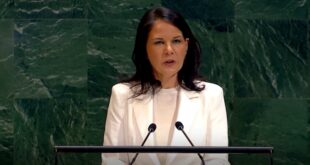The United Nations has praised Germany as a “humanitarian frontrunner” in the resettling of refugees, but German Foreign Minister Sigmar Gabriel warns that the country can’t face the challenges alone.
The United Nations’ refugee agency on Tuesday honoured Germany for being a “humanitarian frontrunner” in helping to tackle the world’s refugee crisis as it marked World Refugee Day. The day highlights the plight facing millions of displaced persons and calls on state actors to make tangible efforts in alleviating the suffering.
Volker Turk, the Assistant High Commissioner for the UN’s Refugee Agency (UNHCR), told German media that Germany had taken a leading role in helping to tackle the plight of refugees. Turk hoped Germany would lead talks on resettling migrants at the G20 summit in Hamburg next month.
Since 2015, Germany has taken in more than a million refugees fleeing conflicts in the Middle East and Africa, although the flow of refugees into the country has significantly slowed in the past year.
More recent efforts instead focused on providing humanitarian aid to besieged regions. Last year alone, Berlin spent some 1.3 billion euros ($1.4 billion) on aid, making it one of the world’s most generous humanitarian spenders. Its humanitarian budget increased ten-fold over the past five years, according to Germany’s foreign minister, Sigmar Gabriel.

Around 307 million euros ($342 million) of that funding went to the UNHCR.
Gabriel, on Tuesday praised the UNHCR for being the country’s “most important humanitarian partner.” However, Germany’s top diplomat also had stern words for the international community, calling on it to do more in dealing with the global refugee crisis.
“Germany can’t cope with these challenges on its own,” Gabriel said. “We need joint international efforts and a fairer distribution of responsibility in order to alleviate the suffering of refugees around the world and prevent long-term refugee crises from happening in the first place.”
The UNHCR reported in its annual global trends on Monday that the total number of people displaced either within their own country or abroad had reached a record of 65.5 million.
In the past year alone more than 10 million people were forcefully uprooted from their homes, while more than 3.5 million people fled their countries. Syria and Afghanistan remain the biggest sources of refugees, with 5.5 million and 2.5 million nationals from the two countries displaced respectively. South Sudan became the world’s fastest-growing displacement crisis last year, according to the UNHCR. The number of South Sudanese who fled across the border almost doubled in 2016 from just under 800,000 to around 1.4 million.
© DW
 THE AFRICAN COURIER. Reporting Africa and its Diaspora! The African Courier is an international magazine published in Germany to report on Africa and the Diaspora African experience. The first issue of the bimonthly magazine appeared on the newsstands on 15 February 1998. The African Courier is a communication forum for European-African political, economic and cultural exchanges, and a voice for Africa in Europe.
THE AFRICAN COURIER. Reporting Africa and its Diaspora! The African Courier is an international magazine published in Germany to report on Africa and the Diaspora African experience. The first issue of the bimonthly magazine appeared on the newsstands on 15 February 1998. The African Courier is a communication forum for European-African political, economic and cultural exchanges, and a voice for Africa in Europe.



















